Is it a bloody victory?
- Carys Edwards
- Feb 22, 2017
- 4 min read

“Luxury” tampons. Image by FastilyClone via wiki commons / cc0 (CC BY-SA 3.0)
Tampons. Pads. Periods. For some reason, hearing these words makes most people (men in particular) recoil in disgust. So much so that there’s still 5 per cent VAT on female sanitary products, and the question of whether they can ever be free is one that’s consistently ridiculed as impossible.
Toilet paper is freely available in public because it’s widely encouraged to use it for hygiene reasons. Is feminine hygiene not recognised as a health issue too? Clearly the UK government doesn’t think so.
In 1973, sanitary products were labelled as "non-essential, luxury items" and taxed at 17.5 per cent. The dictionary definition for luxury is: "A state of great comfort or elegance, especially when involving great expense." They’ve got the expensive part right but the cardboard or plastic covered tubes are neither comfortable nor elegant despite how much the leading brands try to sell them as that.
Luckily, in 2000 the government finally saw (some) sense and sanitary products were subjected to a much lower, but still bizarre, 5 per cent VAT.
Feminists have argued against the ‘tax on women’ for years and a petition, "Stop taxing periods. Period.", was set up by a modern day Emmeline Pankhurst, Laura Coryton, in 2014. In March 2016 the petition had more than 320,000 signatures and was labelled as a "victory" as George Osborne, the ex-Chancellor of the Exchequer, introduced legislation to scrap women’s sanitary taxes as part of the new Finance Bill.
Is it really a "victory"?
Researchers have found that women spend up to £18,450 on menstruating about 450 times in their lifetime. The study, by Voucher Codes Pro, took into account the cost of sanitary products as well as pain relief and other necessary items.
Despite the high costs of womanhood, the dropping of the tampon tax has been quashed after Brexit hit Britain like a bomb and left the future looking like a looming dark hole of unanswerable questions. A word hasn’t been heard since the bill was accepted in parliament.
The tax was initially supposed to be repealed in the summer of 2016. It was then delayed until August but now it seems we may have to wait until April 2018 for an unfair tax to disappear due to apparent "Brexit complications". Well, that’s bullshit.
Maybe the patriarchal society is so unenthusiastic about women’s health that it just doesn’t understand that.
The apparent reason for keeping the outdated tax was that the UK would be in breach of European law if it tried to scrap it. Now the restraints of the EU are no longer a valid excuse, you’d expect the government to be ploughing ahead full steam to get new legislation passed, but the opposite has happened. It’s all gone quiet.
George Osborne has crawled into a dark hole with no sign of following through with his pledge. While the new chancellor of the exchequer, Philip Hammond, who voted against an amendment to scrap the tax back in October 2015, has no further comment.
It’s an enervating waiting game but even without the tax, the fact that women are being forced to pay discriminatory fees to not bleed on themselves, is systematic sexism at its finest.
Being exempt from tax would only put sanitary products in the same bracket as other zero tax items such as Jaffa Cakes, helicopters, and crocodile meat. Until they are recognised as necessary health goods and not cosmetics then full gender equality and women’s human rights don’t exist.
Condoms are exempt from tax and available for free, as they should be, but why are the same rules not applied to sanitary products? People make the conscious decision to have sex; no one chooses to bleed profusely from their uterus. Yet we live in a society that doesn’t safely protect a bodily function of the female reproductive system. The cost of menstruation has normalised cramming your body with NHS-funded hormones, like the pill, because it’s easier than scraping together the pennies for sanitary products each month; that’s not right.
It’s recommended to change your tampon every six hours (otherwise the very real life-threatening risk of getting the bacterial infection Toxic Shock Syndrome and losing a leg looms) so that’s 25 tampons for just one menstruation cycle. That's a lot of money.
Something that not only gives us painful cramps is costing us an obscene fee that’s extremely taxing (pardon the pun) on low-income earners and students alike.
Global Menstruation Hygiene Day on 28 May is aiming to acknowledge periods as a very normal part of life because, until people understand what a fundamental part of women’s lives they are, they won’t understand how hard it impacts them financially.
Even though it looks like we’re set for a victory in repealing the repressive tax, it’s time to make sanitary products available for free.
As Gloria Steinem said in 1986: "What would happen if suddenly, magically, men could menstruate and women could not?
Clearly, menstruation would become an enviable, worthy, masculine event…Sanitary supplies would be federally funded and free."
After all, you get your period, tampon or not.


Comments